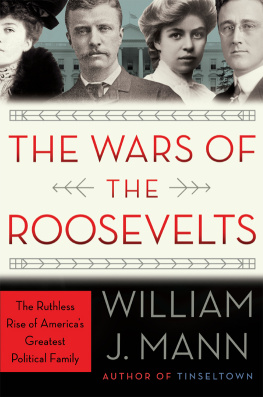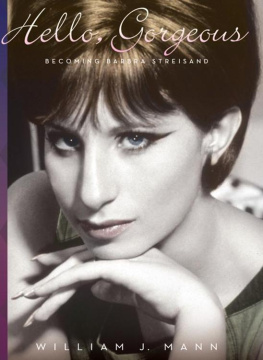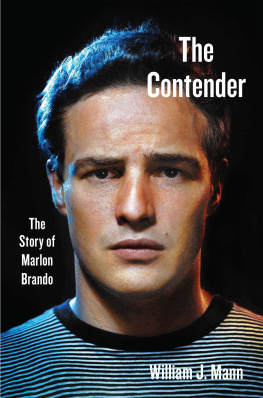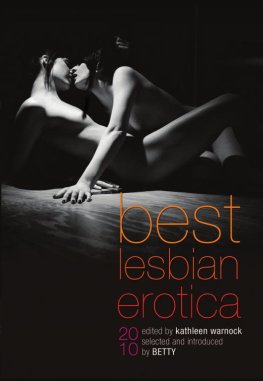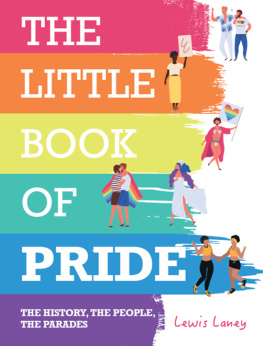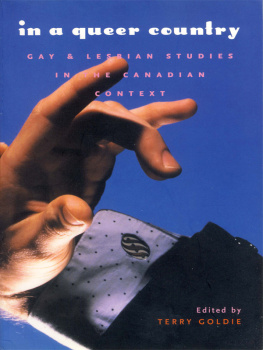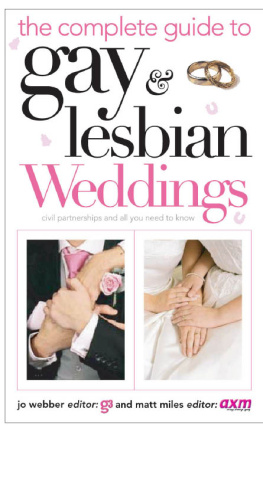BOOKS BY WILLIAM J. MANN
Novels
The Men from the Boys
The Biograph Girl
Where the Boys Are
Nonfiction
Wisecracker:The Life and Times of William Haines,
Hollywoods First Openly Gay Star
Behind the Screen: How Gays and Lesbians Shaped
Hollywood 19101969
Edge of Midnight: The Life of John Schlesinger
G AY P RIDE
A Celebration of All Things Gay and Lesbian
William J. Mann
CITADEL PRESS
Kensington Publishing Corp.
www.kensingtonbooks.com
All copyrighted material within is Attributor Protected.
Introduction
When my editor, John Scognamiglio, asked me if Id come up with a list of 101 reasons I was proud to be gay, I thought it would be easy. Sure enough, lots of ideas came to me, and even more rolled in when I started polling my partner, Dr. Tim Huber, and several of my friends. The hard part came in cutting them down to 101; youll find me longing for a 102nd slot several times in the following list.
In collections like these, of course, there will always be disagreements. What about this? How could you omit that? I tried not to be American centric, remembering that the great big gay world extends across the globe, but my particular life experience cannot help but influence my choices. I hope this will serve as a springboard for lots of other ideas. The reasons for pride are truly endless.
The Great MGM Musicals
Singin in the Rain. Easter Parade. Words and Music. Babes in Arms. Meet Me in St. Louis. For Me and My Gal. The Pirate. Ziegfeld Follies. Annie Get Your Gun. Show Boat. An American in Paris.
The list could go on and on, but you get the picture. All those great 1940s and 50s movie musicals came from gay talent. The Freed Unit at MGM has been widely hailed as the greatest musical-producing department in the entire studio era. While head honcho Arthur Freed wasnt gay himself, his unit was dubbed Freeds Fairies. Everyone knew it was a powerhouse force of creative queens turning out these pictures, led by the inimitable Roger Edens, the same man whod spotted the talent in a chubby little unknown girl named Frances Gumm and molded her into Judy Garland. Edens was responsible for some of the best musicals of all time: in addition to producing the above films, he also provided musical adaptations for The Wizard of Oz and On the Town, and on his own produced Funny Face and Hello Dolly!
Edens wasnt Freeds only fairy: there were also directors Charles Walters and Vincente Minnelli (though the latter did his best to pretend otherwise), orchestral arranger Conrad Salinger, choreographers Robert Alton and Jack Cole, dancer and Freed assistant Don Loper, and many others. The Freed musicals revolutionized the genre by seamlessly integrating the musical and dance elements into the storylinea heritage acknowledged as recently as the film version of Chicago, which also had a largely gay creative team behind it.
So next time one of these gems shows up on Turner Classic Movies, take a look. Observe the gay sensibility at work in the Great Lady sequence of Ziegfeld Follies. Listen to the texture and color in the orchestration of Meet Me in St. Louis. Watch Judy Garland turn gender roles upside-down in Easter Parade. The work of Freeds Fairies is indeed immortal.
Alexander the Great
Okay, so how are we supposed to be proud of a cutthroat invader who conquered most of Eurasia, sacked cities, sold folks into slavery, and casually whacked off peoples heads with his sword? In truth, historians tend to view Alexander as one of the more benevolent of despots, enlightened for his time (which was, after all, circa 330 B.C. ). He insisted on treating his conquered hordes with equanimity, often restoring the vanquished rulers to power. He rejected the Greek ideal that the Persians and other races were inferior barbarians, fit only for Greek domination. In fact, he integrated much of Persian culture into his court, even taking a Persian boy as a lover. He was known for his toleranceallowing a degree of religious freedom in his empireand had a deep and abiding respect for women. There was no harem chained by the ankles following Alexanders army.
Maybe thats because Alexanderking of Macedonia and conqueror of most of the world as then knownwas too much in love with his boyhood friend Hephaestion to ever have time to rape and enslave women the way his contemporaries did. Now matter how current movies depict him, Alexander seems to have been predominately attracted to men. Both Alexander and Hephaestion had been tutored by Aristotle, with Alexander envisioning themselves as those two great heroes from Greek tradition, Achilles and Patroclus.
Most historians now accept that the relationship between Alexander and Hephaestion was romantic and sexual. While same-sex sexual relationships were a common and accepted part of the ancient world, these tended to end in adulthood with marriage to a woman. But Alexander and Hephaestion remained steadfast until the endtwo adult men as companions and lovers, their relationship recognized by the world (much of which, of course, they ruled). Long after Alexanders death, the Cynic philosophers would say that he had been defeated just once in his life, and that was by Hephaestions thighs.
Off-Off Broadway
You take it for granted now, all those naked boys singing and those strange edgy shows in coffeehouses where girls smear themselves with chocolate. But Off-Off Broadway hasnt always been an option for theatergoers. In the late 1950s and early 60s, an alternative theater movement arose, spearheaded by avant-garde artists like Judith Malina and Julian Beckas well as one man whose name has become synonymous with bold, risk-taking theater: Joe Cino.
It was Cino who opened and gave his name to the Caffe Cino at 31 Cornelia Street in New York Citys Greenwich Village in 1958the birth of Off-Off-Broadway. The Cino influence on American theater cannot be exaggerated. Here such dramatists as Tom Eyen, John Guare, Robert Heide, William Hoffman, Harry Koutoukas, Doric Wilson, Robert Patrick, Sam Shepard, and Lanford Wilson got their start. And right from the beginning, Cino had an obvious gay influence, championed by the unapologetic, openly gay man at its head. Most of the artists who worked at the Cino were, in fact, gay men, friends of Joes brought into the charged, creative atmosphere of the little theater. Ten years before Stonewalland already a conscious, distinctly gay sensibility was being articulated in their work.
When Lanford Wilsons one-act about a drag queen in crisis, The Madness of Lady Bright, opened at the Caffe Cino in 1964, gay theater was bornfollowed a few months later by Robert Patricks The Haunted Host. But what made Joe Cinos coffeehouse-theater so revolutionaryand lastingly influentialwas his seamless integration of sensibilities, moving from Wilsons camp to the realism of Sam Shepard, transcending easy labels like gay and straight. Plays presented at the Cino ranged from reconsiderations of the classics to new, experimental plays and even to musicals: Dames at Sea ran for years Off-Broadway and made a star of Bernadette Peters.
Joe Cinos legacy was to ensure a place outside the safe, careful theater mainstream for work that dared to defy convention. The theater closed when Cino died in 1967still two years before the supposed start of the American gay movementbut its influence remained, setting the stage (so to speak) for the Judson Poets Theatre, La Mama, and Charles Ludlums Ridiculous Theater Company, all of which revitalized the New York theater scene by making sure fringe voices had a chance to be heard.





